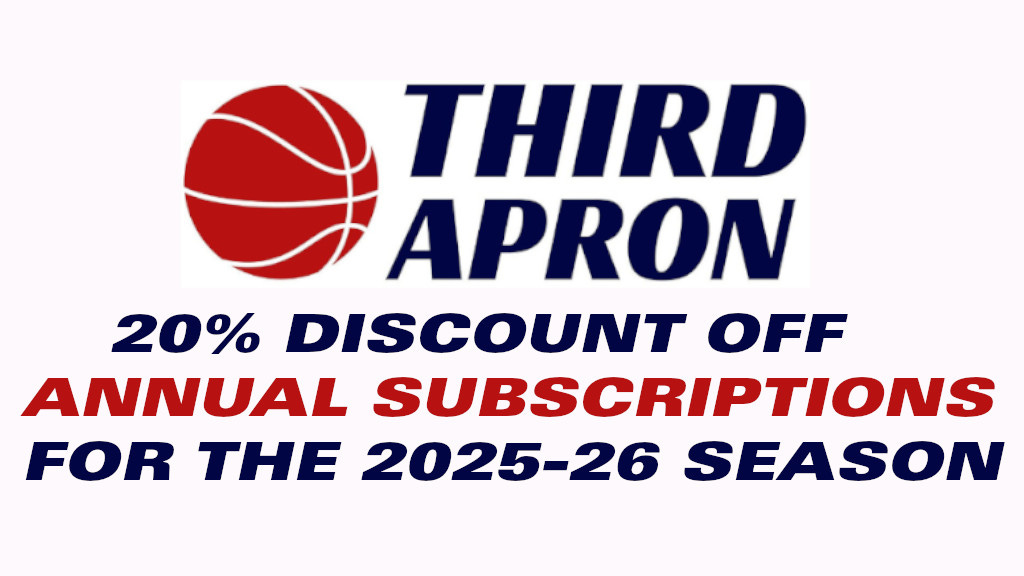The Blazers Negotiation Wins and What Could Come Next
I review the Blazers recent extensions, why they were worth the future cap flexibility, and what moves could be next, including a long-shot Deni Avdija renegotiation. Also, Third Apron is on sale!
Quick announcement: Third Apron is having a sale on annual subscriptions! If you’re a free subscriber, please consider supporting us and upgrading to paid tier for access to all of our work.
The first four days of the NBA regular season weren’t short of entertaining basketball. A multitude of overtime games, ridiculous stat lines, and the unlocking of Victor Wembanyama into the unstoppable force we all feared are just some of the headlines. So far, it looks like the new TV partners are off to a great start, pushing forward their presentation and analysis.
Although this didn’t engulf the good vibes, a massive scandal emerged when the FBI arrested several figures associated with the NBA for sharing information that could benefit gambling and an illegal poker game. One current player, Terry Rozier, was arrested, but accusations against him were already known. It was the arrest of Blazers head coach Chauncey Billups that was most stunning for his involvement in these poker games.
This capped off what was a busy week for the Blazers, who named Tiago Splitter interim head coach. They lost a hard-fought game against the Timberwolves in their season opener under Billups, but followed it up with a blowout win over a motivated Warriors team (albeit on the second night of a back-to-back for them) under Splitter.
If the allegations are true, Billups’ time in the NBA in any capacity would be over going forward. It will take time for the legal process to play out, which means his leave could extend through the season. This, at the very least, puts his future with the Blazers in doubt. The team could very well move on from him if they reach their playoff expectations without him.
More positively, the Blazers made long-term commitments to two of their most important players: Shaedon Sharpe and Toumani Camara. Both deals represent the first developmental and scouting wins for the Blazers front office. They were needed after a shaky first couple of years starting the rebuild.
The Blazers extended Sharpe on a rookie-scale contract worth four years, $90 million. He had a slow start to his career with a rough rookie season as one of the league’s youngest players. He also missed most of his sophomore season with injuries. But he followed it up with a strong third season where he reached the floor of his expected offensive potential.
Most players who sign rookie-scale extensions below the maximum are making compromises, with Sharpe’s looking like the biggest among the 2022 draft extension class. His contract will average 11-12 percent of the salary cap annually, which feels low. That percentage is similar to the current contracts of scoring guards like Norman Powell and Collin Sexton.
Sharpe’s impact so far hasn’t exceeded those players. As a baseline, this contract is fine if he stalls out as the player he currently is and becomes a sixth man. But if he can start knocking down more threes and become passable defensively, then this has the chance to be one of the most valuable contracts in the league.
And that’s before accounting for expected scoring improvements. He’s not off to a great start this season, but so far, he’s among the Blazers’ top options offensively with the most field goal attempts per game. It goes without saying that this is a major negotiating win for the Blazers.
The Blazers also extended Camara to four years, $81 million, before agreeing to Sharpe’s deal. This one requires less explanation. An annual salary of 10-11 percent of the salary cap for one of the best defenders in the league, who could guard just about any position, is cheap. So far, he’s played the majority of their backup center minutes over Hansen Yang and Duop Reath while Robert Williams III is out.
It’s worth noting that a new class of contract for starting-level, defensive-minded, non-scoring wings has emerged with Herb Jones’ three-year, $68 million extension. Camara’s contract, as well as Aaron Nesmith’s recent two-year, $40 million contract, are based on it.
By comparison, these contracts are a lower percentage than the rookie-scale extensions OG Anunoby and Mikal Bridges signed with the Raptors and Suns, respectively. Camara doesn’t project with the offensive potential of these players, but if he can at least continue to hit catch and shoot threes at last year’s rate, his contract should be viewed just as favorably.
This contract came at a cost, however. Camara was set to have a $2.4 million team option for 2026-27. Instead of rostering him at that amount for one more season, they rewarded him with a raise that will replace that amount with a $18 million salary.
So why did they extend him so early?




